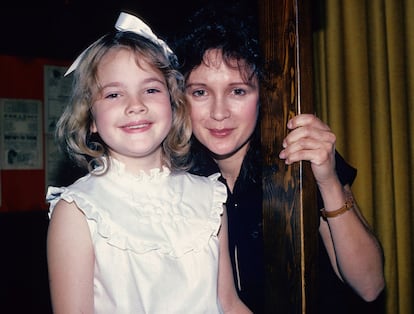Drew Barrymore opens up on her stormy relationship with her mother: ‘She created a monster and didn’t know what to do’
The actress has been forced to refute claims she wished her mom was dead after the media misinterpreted her words in a revealing interview with ‘New York’ magazine

Drew Barrymore, 48, the legendary child star of ET and successful TV host, has never hidden the fact that her relationship with her parents, particularly her mother, has never been easy.
Drew’s mother Jaid Barrymore was the daughter of Hungarian immigrants who came to the United States in the 1950s in search of a better life. In the 1970s, she married Drew Barrymore’s father, actor John Drew Barrymore.
But by the time Drew Barrymore was a child star, the two were divorced, and Jaid was focusing all her efforts on being her daughter’s manager. She, however, had less interest in being a mom. While Jaid Barrymore had starred in some minor productions in the early 1980s, it was her funny and tender six-year-old daughter who was the main breadwinner in the family.
Barrymore has spoken on various occasions about how her mother took her to the Studio 54 nightclub, where she let her drink alcohol as if she were an adult. When she was just 12 years old, the actress was admitted into rehab. Later, on her mother’s initiative, she was committed to a psychiatric center for a year and a half. Barrymore says she no longer holds a grudge against her mother for what happened during those years, but admits that the two had a very stormy relationship.
“I think she created a monster, and she didn’t know what to do with the monster,” she told the Howard Stern Show in 2021.
Barrymore’s relationship with her mother made headlines again this week, after the actress told New York magazine that she had been jealous of friends who managed to work through their trauma after losing a parent.

“All their moms are gone, and my mom’s not. And I’m like, ‘Well, I don’t have that luxury.’ But I cannot wait,” she said. “I don’t want to live in a state where I wish someone to be gone sooner than they’re meant to be so I can grow. I actually want her to be happy and thrive and be healthy. But I have to fucking grow in spite of her being on this planet.”
The comments were quickly misinterpreted by some media outlets. The celebrity news site Page Six, for example, published a story with the headline: “Drew Barrymore admits she wishes her mother, Jaid, was dead.”
In an Instagram video, Barrymore said that the media had maliciously taken her words out of context. “To all you tabloids out there, you have been fucking with my life since I was 13 years old. I have never said that I wished my mother was dead,” Barrymore said in the video posted on Tuesday. “Don’t twist my words around or ever say that I wish my mother was dead. I have never said that. I never would,” she added.
According to the actress, she and her mother have been on friendly terms for the past few years, Drew Barrymore even texted her for her birthday.
Her father died of cancer at the age of 72, after a lifetime of alcoholism and drug dependence. Drew Barrymore paid for all his medical bills, and it was she who scattered his ashes in the place he requested: Joshua Tree Park.
Sign up for our weekly newsletter to get more English-language news coverage from EL PAÍS USA Edition
Tu suscripción se está usando en otro dispositivo
¿Quieres añadir otro usuario a tu suscripción?
Si continúas leyendo en este dispositivo, no se podrá leer en el otro.
FlechaTu suscripción se está usando en otro dispositivo y solo puedes acceder a EL PAÍS desde un dispositivo a la vez.
Si quieres compartir tu cuenta, cambia tu suscripción a la modalidad Premium, así podrás añadir otro usuario. Cada uno accederá con su propia cuenta de email, lo que os permitirá personalizar vuestra experiencia en EL PAÍS.
¿Tienes una suscripción de empresa? Accede aquí para contratar más cuentas.
En el caso de no saber quién está usando tu cuenta, te recomendamos cambiar tu contraseña aquí.
Si decides continuar compartiendo tu cuenta, este mensaje se mostrará en tu dispositivo y en el de la otra persona que está usando tu cuenta de forma indefinida, afectando a tu experiencia de lectura. Puedes consultar aquí los términos y condiciones de la suscripción digital.








































